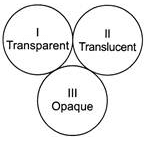Test: How things work - CTET & State TET MCQ
20 Questions MCQ Test - Test: How things work
A plane mirror reflects a pencil of light to form a real image. What is the incident of the pencil of light on the mirror?
| 1 Crore+ students have signed up on EduRev. Have you? Download the App |

Which of the items above will allow you to see around a corner from where you are standing?
You are standing upright in a room in front of a vertical mirror. In this mirror, you can see from your position, only the upper two- third part of your body. You wish to see the full image of your body in the mirror. Which combination of the following three courses of action will achieve this?
I. Move away from the mirror
II. Move towards the mirror
III. Use a mirror whose height will allow you to see your full image
Vijay puts some water into four cups made of steel, porcelain, glass, frosted glass. Which one of these cups will allow him to see the level of the water clearly?
There is no dark shadow formed by the glass when light is shone on it. This is because

Geeta placed three objects made of different materials as shown in the figure. She observed a bright spot of light at (II) but (III) would not get any spot.-Then,

Read the given statements and select the correct option,
Statement 1: Rahul placed a colored plastic bottle in front of the beam of a torch light. Then he placed a transparent sheet of same size on the other side of bottle. No shadow will form on the screen.
Statement 2: Translucent objects allow light to pass through them partially.
When Abhishek looked at a lighted torch through an object he could see a faint glow, but not the torch. The object is
A girl is 4 m away from the plane mirror. If she moves few steps closer to the mirror, what will happen to the image size in the mirror?

Fill in the blanks with most appropriate option. Although a number of objects, such as kites, birds, aeroplanes move in space, but their shadow is not seen on the earth. This is due to the reason that the
(i), the region of complete (ii) is not able to reach the earth. The region of partial (iii), that is the (iv) reaching the earth is too large and too faint to be visible to us.
Riya and Priya were sitting around a round table. They noticed that they could see their own and each other's image onto the table top. Then table top is made of
The diagram shows an object O viewed using two mirrors. A person looks into the mirrors as shown. At which position is the image of O seen?

Look at the Venn diagram. Which of the following objects described below are most likely to be I, II and III? Choose the correct option.

Which of the following allows light to pass through it easily?
A solid transparent sphere has a small opaque dot at its centre. When observed from outside, the apparent position of the dot will be
Nisha placed a stick in the playground at 8:15 am in the morning. How will the shadow of the stick at 12:00 noon be in comparison to the one at 8:15 am?



















